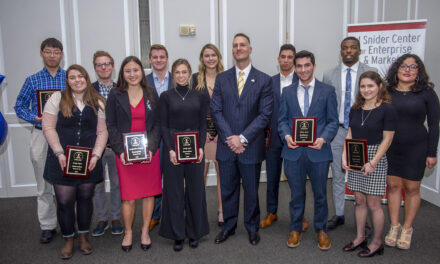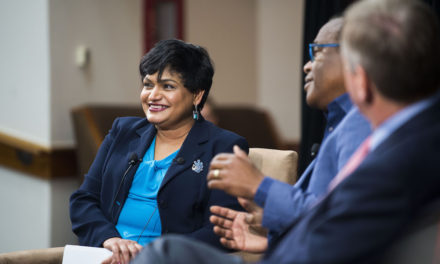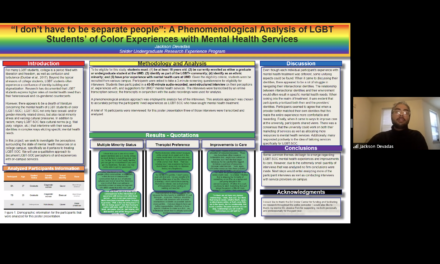UMD Students Partner with African Entrepreneurs to Solve Business Challenges
UMD Students Partner with African Entrepreneurs to Solve Business Challenges
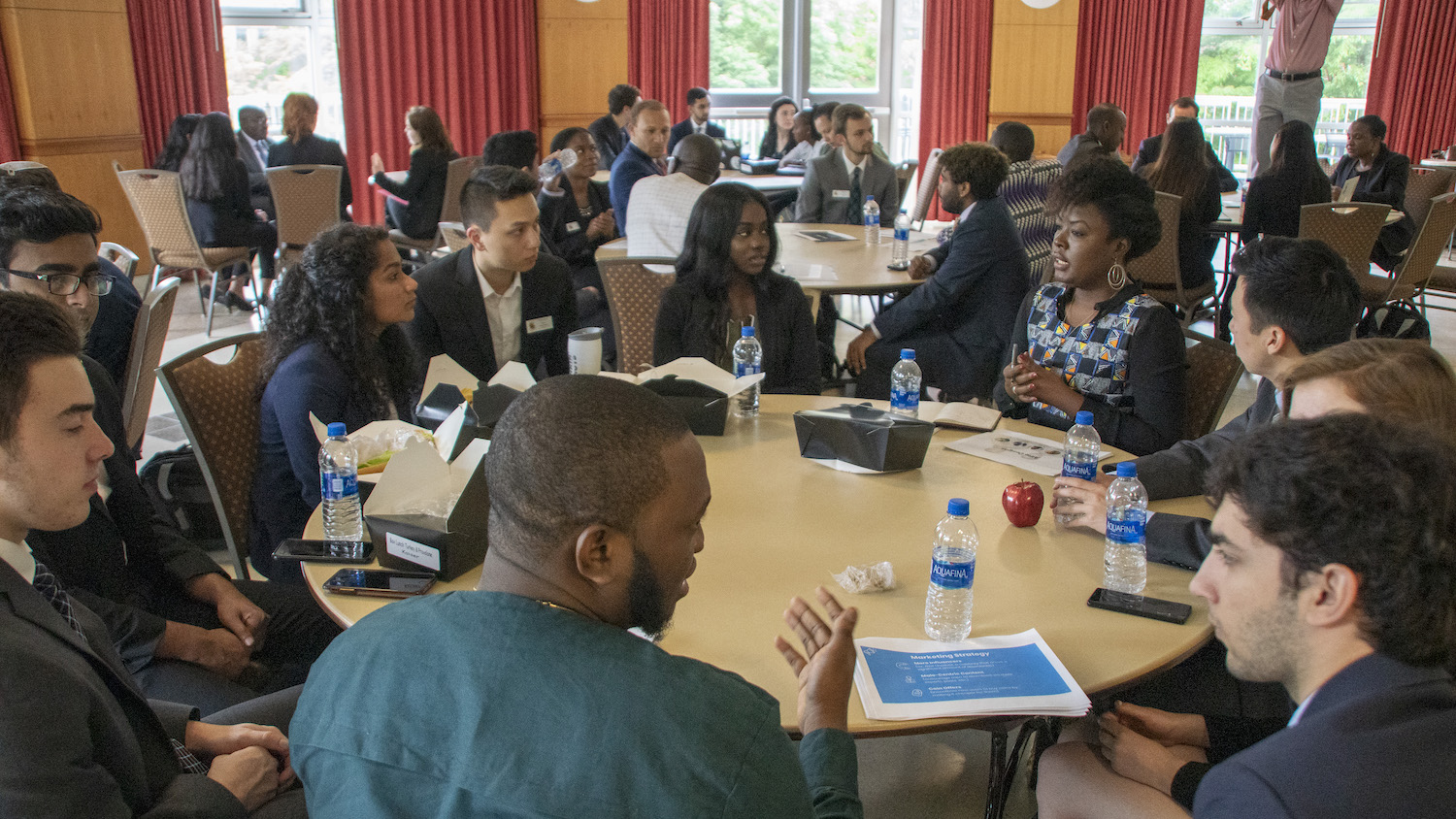
“So, I’d like to jump right into our opportunity,” said Alex Johnson, leading off Team PRISM’s QUEST student presentation. “Four years ago, Peju founded Mother’s Delivery Kit with the vision to eradicate maternal and infant mortality in Nigeria,” he continued. “And all of Africa.”
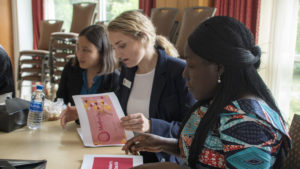 Johnson, a QUEST honors program scholar, together with his 4 teammates, introduced and explained the product they’d been chosen to represent, Mother’s Delivery Kit, which was founded in 2014 by Nigerian entrepreneur Adepeju Jaiyeoba, or ‘Peju’ for short. Peju became interested in the subject of infant and maternal mortality in Uganda after her dear friend died during childbirth in 2011. “You hear these numbers: one in 10, one in six,” she says. “And they’re just numbers until you know someone who is a statistic. Then each number becomes a face.” Inspired to act after her friend died, Peju created the kits. Each kit contains information and sterile supplies to help laboring women deliver a healthy baby. To date, her product has enabled one million safe deliveries. For her, the kits are less a means of making a living, and more of moral imperative. “Our normal is doing nothing and staying in our comfort zone. Our normal is not challenging these norms, and refusing to take action and courage.” She wants people to rise to the occasion to change lives. “Normal is another word for average,” she says. “I am not normal.”
Johnson, a QUEST honors program scholar, together with his 4 teammates, introduced and explained the product they’d been chosen to represent, Mother’s Delivery Kit, which was founded in 2014 by Nigerian entrepreneur Adepeju Jaiyeoba, or ‘Peju’ for short. Peju became interested in the subject of infant and maternal mortality in Uganda after her dear friend died during childbirth in 2011. “You hear these numbers: one in 10, one in six,” she says. “And they’re just numbers until you know someone who is a statistic. Then each number becomes a face.” Inspired to act after her friend died, Peju created the kits. Each kit contains information and sterile supplies to help laboring women deliver a healthy baby. To date, her product has enabled one million safe deliveries. For her, the kits are less a means of making a living, and more of moral imperative. “Our normal is doing nothing and staying in our comfort zone. Our normal is not challenging these norms, and refusing to take action and courage.” She wants people to rise to the occasion to change lives. “Normal is another word for average,” she says. “I am not normal.”
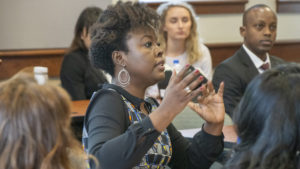
Peju is just one of eight entrepreneurs to partner with QUEST honors program students. Over two days this past semester, the teams presented their recommendations to their partner entrepreneurs, professors and fellow students. It’s all part of a new collaboration between the University of Maryland’s Ed Snider Center and the United States African Development Foundation (USADF). The products themselves are incredibly diverse, ranging from nutritive cereals to a solar array meant to bring electricity to off-the-grid South African towns. Each product is innovative, bringing much-needed services or products to the populations the entrepreneurs wish to serve. But each entrepreneur faces challenges in their business, which range from expanding and streamlining marketing efforts to laying the groundwork for product distribution. And that’s where the teams of students come in. They hear directly from each entrepreneur, learning what works well, and what problems the entrepreneur would like to address. In the case of the Mother’s Delivery Kit, Peju reported having trouble marketing the kits and expanding their distribution. She’s undaunted in her efforts to bring these kits to Nigerian women. The team discovered, after talking with her about the challenges that she faces, that Peju herself is basically the only person running the day-to-day business side of things. In addition, she’s having trouble expanding into hospitals because she currently relies on a middle man to distribute the kits. “Sixty percent of deliveries in Nigeria are taken by traditional birth attendants who have no education, and are unskilled,” she says. “This should never be our normal.” She’d further like to gather solid data about each mother receiving and using the kits, but her current methods are inefficient – data collection is currently being done by hand.
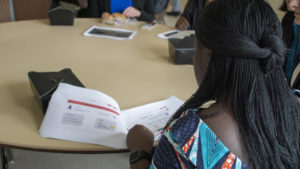 As part of their suggestions to Peju, the team developed ideas for efficient data collection and marketing, including an innovative app that works where internet infrastructure is less robust. It takes into account the fact that both workers and mothers may be low literacy or illiterate. And its automatic data collection and collation means that Peju will be able to make use of reliable, comprehensive data almost immediately. The other teams presented similarly customized solutions for their partners. “We’re giving students an opportunity to take a deep dive into problem solving in a small business,” said Joe Bailey, Executive Director of the QUEST program. This would be useful in any case, Bailey continued, but he finds it particularly instructive to deal with these sorts of challenges outside the parameters of the United States.
As part of their suggestions to Peju, the team developed ideas for efficient data collection and marketing, including an innovative app that works where internet infrastructure is less robust. It takes into account the fact that both workers and mothers may be low literacy or illiterate. And its automatic data collection and collation means that Peju will be able to make use of reliable, comprehensive data almost immediately. The other teams presented similarly customized solutions for their partners. “We’re giving students an opportunity to take a deep dive into problem solving in a small business,” said Joe Bailey, Executive Director of the QUEST program. This would be useful in any case, Bailey continued, but he finds it particularly instructive to deal with these sorts of challenges outside the parameters of the United States.
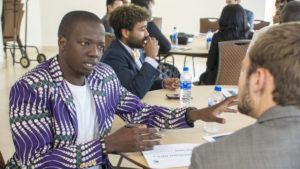 The unique partnership between the University of Maryland and the USADF began last Fall, when Christina Elson, Managing Director of the Ed Snider Center and a Faculty Leader of QUEST approached USADF President and CEO CD Glin about making the partnership a reality. “We began a conversation with USADF about two years ago,” said Elson. “CD Glin wanted to create opportunities for entrepreneurs in Africa, and it seemed an interesting way for students to engage with real-life entrepreneurs and opportunities. These entrepreneurs are doing amazing things,” said Elson. “And our students love working with them and helping to solve real-world problems. As these business continue to flourish, the students are excited about continuing these relationships.”
The unique partnership between the University of Maryland and the USADF began last Fall, when Christina Elson, Managing Director of the Ed Snider Center and a Faculty Leader of QUEST approached USADF President and CEO CD Glin about making the partnership a reality. “We began a conversation with USADF about two years ago,” said Elson. “CD Glin wanted to create opportunities for entrepreneurs in Africa, and it seemed an interesting way for students to engage with real-life entrepreneurs and opportunities. These entrepreneurs are doing amazing things,” said Elson. “And our students love working with them and helping to solve real-world problems. As these business continue to flourish, the students are excited about continuing these relationships.”
Lia Kvatum is a freelance writer and producer based in Washington, DC. In addition to the Ed Snider Center, her clients include The National Geographic Society, The Smithsonian Institution, PBS, and the Washington Post. More of her work can be seen at LiaKComms.com.


